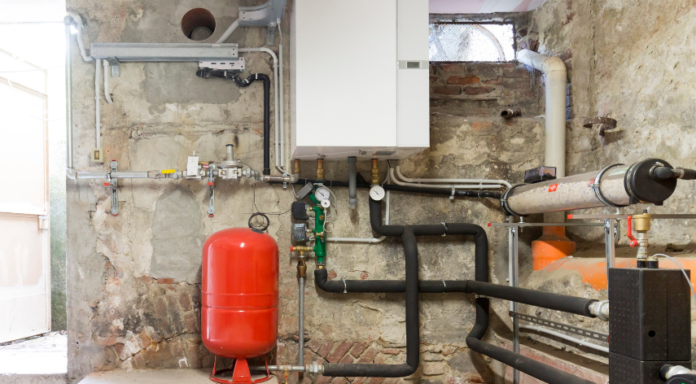Introduced by UK Building Regulations in 2005, condensing boilers are essential for reducing carbon emissions. These boilers operate at lower flue gas temperatures, allowing moisture to condense and improve efficiency. However, during extreme cold, condensate discharge pipes can freeze, causing boiler shutdowns. So proper insulation is crucial. Now, if you want to opt for a condensing boiler installation, there are ECO4 grants that might be helpful in the free installation. Remember, condensing boilers are a smart choice for both your pocket and the planet! It will boost your EPC rating and you’ll enjoy a warm and comfortable home.
For more detailed information, you can check out this complete guide to condensing boilers.
What’s a condensing boiler and how does it work?
A condensing boiler runs on gas or oil and is designed to improve energy efficiency. When lit, this boiler uses a primary heat exchanger to transfer heat from the burner. The hot air then travels through a secondary condensing area, where it condenses, creating a water vapour. Moreover, this process allows condensing boilers to achieve over 90% energy efficiency. They do so by recovering lost heat from waste gases. Now, if you’re wondering whether your boiler is condensing, check if it was installed after April 2005. Plus, you can inspect the flue because metal flues indicate non-condensing boilers.
What is the difference between a condensing boiler and a non-condensing one?
Condensing boilers are super efficient. They grab heat from gas and turn it into water, making them work better. They usually work at 90% or more. Non-condensing boilers, on the other hand, aren’t as good. They don’t grab heat from gas, so they work at 80% to 85%. Moreover, condensing boilers have a second heat exchanger. This catches more heat from gas and makes water. This helps them work better. Non-condensing boilers only have one heat exchanger and can’t make water.
Secondly, condensing boilers have cooler gas. It’s about 50°C to 60°C. But non-condensing boilers, have hotter gas, usually above 100°C. Thirdly, condensing boilers need special vents for their cooler gas. They use plastic. But non-condensing boilers can use regular metal pipes. Finally, condensing boilers use less fuel, so they make less pollution. Non-condensing boilers, on the other hand, use more fuel, so they cause more pollution.
What are the pros of a condensing boiler?
Condensing boilers are super efficient, saving lots of energy by trapping heat from gases, usually working at 98% or more. Below are some of the advantages of these boilers:
- High efficiency: Condensing boilers recover heat from flue gases. As a result, they achieve efficiency levels of 90% or higher. This reduces energy consumption and lowers utility bills.
- Reduced environmental impact: Lower fuel consumption means fewer greenhouse gas emissions. So, this contributes to a greener environment.
- Comfort: Condensing boilers provide consistent and comfortable heating due to their efficient operation.
- Compact size: They are often smaller and more space-efficient than non-condensing boilers.
- Quiet operation: Condensing boilers operate quietly, enhancing home comfort.
What are the cons of a condensing boiler?
Condensing boilers need special vents for their cooler gases. This might cost more to install. Plus, they might not work well everywhere or with every heating system. Below are some disadvantages of these boilers:
- Initial cost: Condensing boilers are more expensive to purchase and install.
- Venting requirements: Special venting materials (usually plastic) are needed to handle low-temperature flue gases. Moreover, this can add to installation costs.
- Maintenance Complexity: The condensate discharge system requires regular maintenance to prevent blockages.
- Cold weather considerations: In extremely cold climates, condensate pipes may freeze. So this can affect boiler operation.
- Compatibility: Some older heating systems may not be compatible with condensing boilers.
How do I choose the right size of a condensing boiler for my home?
Choosing the right size of a condensing boiler for your home is crucial to ensure efficient heating and hot water supply. Let’s break it down:
Boiler types:
There are three main types of boilers: Combi, System, and Regular.
- Combi Boilers: Small, compact, and provide instant hot water.
- System Boilers: Need a hot water cylinder for storing hot water.
- Regular Boilers: Need a cold water tank and are common in traditional heating systems.
Factors to consider:
- Property Size: Larger homes generally need higher output boilers.
- Number of Radiators: Allow approximately 1.5 kW per radiator.
- Bathrooms: Divide around 3 kW per bathroom.
- Insulation Levels: Well-insulated homes may need less heating power.
- Climate: Consider local weather conditions.
Boiler size calculation:
Add up the kW requirements based on radiators and bathrooms. Use the following scores:
- 1 kW for small radiators.
- 1.5 kW for average-sized radiators.
- 2 kW for large radiators.
- Consult a professional installer for personalised advice.
Remember, choosing the right size ensures efficient performance and cost-effectiveness. If you need further help, feel free to ask!
Bottom line
In conclusion, condensing boilers offer impressive efficiency and energy savings. But they come with the need for special venting and potential installation challenges. So understanding their pros and cons is crucial in making an informed decision. Moreover, you need to decide based on individual heating needs. Also, look at your budget, and environmental considerations.


